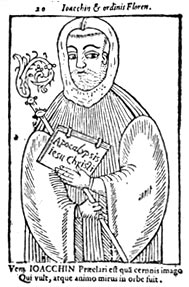
The Joachimites, also known as Joachites, a millenarian group, arose from the Franciscans in the thirteenth century. They based their ideas on the prior works of Joachim of Fiore (c. 1135 – 1202), though rejecting the Church of their day more strongly than he had. Joachimite beliefs were condemned by the Fourth Council of the Lateran[1] and Joachimite interpretations became popular during the Protestant Reformation,[2] and even influenced some Protestant interpretations.[3] He also divided history into three ages: the ages of the Father, the Son, and the Holy Spirit.[4]
- ^ Cite error: The named reference
:0was invoked but never defined (see the help page). - ^ Maas, Korey (2010). The Reformation and Robert Barnes: History, Theology and Polemic in Early Modern England. Boydell & Brewer. ISBN 978-1-84383-534-9.
- ^ Lundin, Roger (1993). The Culture of Interpretation: Christian Faith and the Postmodern World. Wm. B. Eerdmans Publishing. ISBN 978-0-8028-0636-9.
Joachimite interpretation itself prefigured later developments in Protestant and romantic hermeneutics.
- ^ "Joachim Of Fiore | Italian theologian | Britannica". www.britannica.com. Retrieved 2021-12-11.